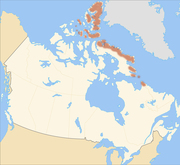|
Home
|
Aug 5, 2019
This week’s themeWords borrowed (adopted) from other languages This week’s words cordillera bondieuserie pareidolia akratic satyagraha 
Arctic Cordillera, Canada
Map: Lanma726/Wikimedia Previous week’s theme Powered by kids A.Word.A.Day
with Anu GargIt’s said about immigration in America that people come here to do what Americans won’t do: harvesting strawberries on farms, cleaning dishes in restaurants, butchering pigs in slaughterhouses. That, and also, writing code, starting new companies, and running Googles and Microsofts (the CEOs of both are immigrants from India, for example). Well, we import words for the same reason. We bring words over from other languages to do what native words can’t or won’t do. We call this borrowing (something like a worker visa), even though the borrowing is permanent (we really naturalize the words). Like all languages, the English language has gaps and these words come in and fill those gaps, helping make the language richer, more expressive. This week we’ll see five words that are borrowed from other languages. cordillera
PRONUNCIATION:
MEANING:
noun: A chain of mountains or mountain ranges.
ETYMOLOGY:
From Spanish cordillera, diminutive of cuerda (cord), from Latin chorda
(cord), from Greek khorde (gut). Earliest documented use: 1704.
USAGE:
“There is a cordillera of laundry, an artificial Christmas tree still
working its way back into the storage closet, a hockey bag putrefying
at the bottom of the stairs.” Jane MacDougall; There Was an Owl in the Basement; National Post (Don Mills, Canada); Mar 16, 2013. A THOUGHT FOR TODAY:
Do unto those downstream as you would have those upstream do unto you.
-Wendell Berry, farmer and author (b. 5 Aug 1934)
|
|
Subscriber Services
Awards | Stats | Links | Privacy Policy
Contribute | Advertise
Awards | Stats | Links | Privacy Policy
Contribute | Advertise
© 1994-2025 Wordsmith